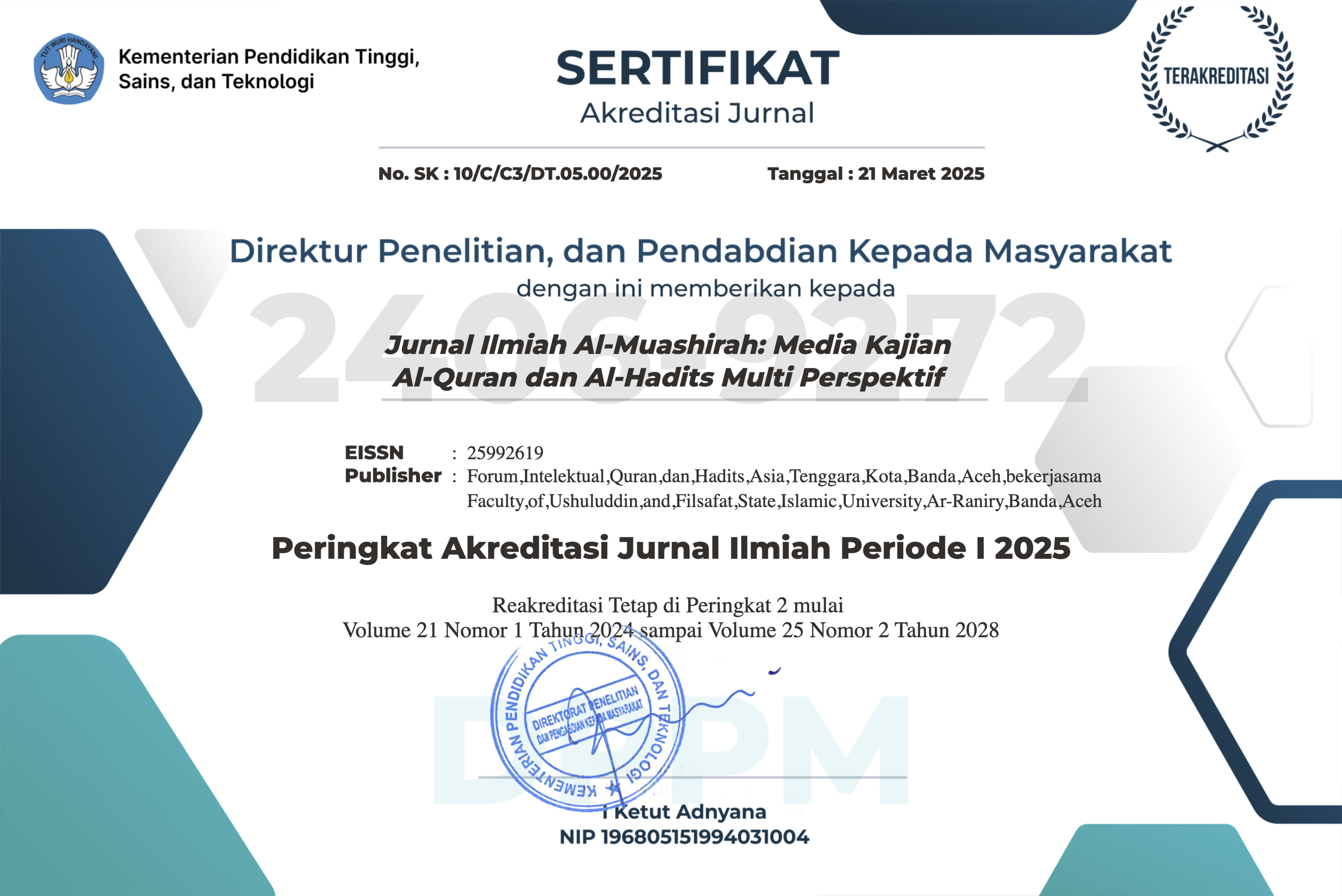THE RULING ON WISHING MERRY CHRISTMAS TO NON-MUSLIMS: AN ANALYSIS OF M. QURAISH SHIHAB'S INTERPRETATIONS
DOI:
https://doi.org/10.22373/jim.v21i1.20040Keywords:
Christmas, M. Quraish Shihab, Inclusive Interpretation.Abstract
The debate on wishing Merry Christmas to non-Muslims has become a major focus in discussions among Muslims in Indonesia. The diverse perspectives on this issue reflect the tension between religious principles and the complex socio-cultural demands of a multicultural society. This study examines M. Quraish Shihab's views on the ruling of wishing Merry Christmas to non-Muslims, focusing on his inclusive interpretation, tolerance, and respect for religious diversity. This research employs a qualitative approach and uses hermeneutical analysis to explore the Qur'anic texts that form the basis of Quraish Shihab's views. The findings show that Quraish Shihab supports the practice of wishing Merry Christmas, considering it permissible in the context of strengthening social relationships, provided it is done with a clear intention and without acknowledging theological aspects that contradict Islam. A comparison with the views of other scholars, such as Ibn Taymiyyah, Yusuf al-Qaradawi, and Ahmed Kutty reveals a variety of opinions on this issue. The study concludes that Quraish Shihab's inclusive approach in his interpretation has made a valuable and positive contribution to understanding and applying Islamic values in a pluralistic society like Indonesia, while also emphasizing the importance of interfaith dialogue and maintaining harmonious social relationships.
Downloads
References
Ahmad, Rumadi, ‘Speaking the Unspeakable: The Status of “Non-Muslims” in Indonesia’, Samarah: Jurnal Hukum Keluarga Dan Hukum Islam, 6.2 (2022), 734 <https://doi.org/10.22373/sjhk.v6i2.13576>
Aiyub, Aiyub, and Isna Mutia, ‘Muhammad Quraish Shihab’s Methodology in Interpretation of The Qur’an’, Jurnal Ilmiah Al-Mu Ashirah, 20.1 (2023), 1 <https://doi.org/10.22373/jim.v20i1.16891>
Al-Qaradawi, Yusuf, The Lawful and the Prohibited in Islam (Cairo: Al-Falah Foundation, 2008)
Amin Ghafur, Saiful, Profil Para Mufassir Al-Qur’an (Yogyakarta: Pustaka Insan Madani, 2008)
Ardi, Rahkman, and Diah Budiarti, ‘The Role of Religious Beliefs and Collective Narcissism in Interreligious Contact on University Students’, Heliyon, 6.9 (2020), e04939 <https://doi.org/10.1016/j.heliyon.2020.e04939>
Ardi, Rahkman, David Hizkia Tobing, Gita Nuraini Agustina, Ahmad Fauzan Iswahyudi, and Diah Budiarti, ‘Religious Schema and Tolerance towards Alienated Groups in Indonesia’, Heliyon, 7.7 (2021), e07603 <https://doi.org/10.1016/j.heliyon.2021.e07603>
Bahri, Syamsul, ‘Mengucapkan Selamat Natal Dan Selamat Hari Raya Agama Lain’, Kalam: Jurnal Agama Dan Sosial Humaniora, 4.2 (2020)
Baidan, Nashruddin, Tafsir Maudhu’i: Solusi Qur’ani Atas Masalah Sosial Kontemporer (Yogyakarta: Pustaka Pelajar, 2011)
Budiana, Yusuf, and Sayiid Nurlie Gandara, ‘Kekhasan Manhaj Tafsir Al-Mishbah Karya M. Quraish Shihab’, Jurnal Iman Dan Spiritualitas, 1.1 (2021)
Cammack, Mark, Islamic Law in Modern Indonesia (Cambridge: Harvard University Press, 2007)
Djidin, M, and Sahiron Syamsuddin, ‘Indonesian Interpretation of the Qur’an on Khilāfah: The Case of Quraish Shihab and Yudian Wahyudi on Qur’an, 2: 30-38’, Al-Jami’ah: Journal of Islamic Studies, 57.1 (2019), 143–66 <https://doi.org/10.14421/ajis.2019.571.143-166>
Esposito, John L., ‘Women in Muslim Family Law’, Verfassung in Recht Und Übersee, 18.1 (1985) <https://doi.org/10.5771/0506-7286-1985-1-78>
Glasford, Demis E., and Justine Calcagno, ‘The Conflict of Harmony: Intergroup Contact, Commonality and Political Solidarity between Minority Groups’, Journal of Experimental Social Psychology, 48.1 (2012), 323–28 <https://doi.org/10.1016/j.jesp.2011.10.001>
Hamka, Buya, Tafsir Al-Azhar (Jakarta: Gema Insani, 2024)
Iqbal, Muhammad, ‘Metode Penafsiran Al-Qur’an M. Quraish Shihab’, TSAQAFAH, 6.2 (2010) <https://doi.org/10.21111/tsaqafah.v6i2.120>
Junaedi, Dedi, ‘Konsep Dan Penerapan Takwil Muhammad Quraish Shihab Dalam Tafsir Al-Mishbah’, Wawasan: Jurnal Ilmiah Agama Dan Sosial Budaya, 2.2 (2017) <https://doi.org/10.15575/jw.v2i2.1645>
Khair, Moh Afiful, Jamiliya Susantin, Syamsul Rijal, and Moh Soheh, ‘MENGUCAPKAN SELAMAT NATAL DAN SELAMAT HARI RAYA PADA AGAMA LAIN: Studi Al-Quran Dan Al-Hadits Multikultural’, AHSANA MEDIA, 9.2 (2023) <https://doi.org/10.31102/ahsanamedia.9.2.2023.102-116>
Khan, Amna, Andrew Lindridge, and Theeranuch Pusaksrikit, ‘Why Some South Asian Muslims Celebrate Christmas: Introducing “Acculturation Trade-Offs”’, Journal of Business Research, 82 (2018), 290–99 <https://doi.org/10.1016/j.jbusres.2017.07.023>
Kodir, Faqihuddin Abdul, Mubādalah: A New Approach to Gender Equality in Islam (Jakarta: Pustaka Pelajar, 2011)
M. Jamil, Muhammad Faisal Hamdani, Iman Jauhari, M. Jafar, and Dahlan, ‘MUSLIM SCHOLARS INTERPRETATION OF DISCOURSE RELIGIOUS TOLERANCE VERSES: The Cases of Quraish Shihab, Yusuf Qaradawi, and Khaled Abou El-Fadl in Qur’ān 60: 8-9’, Journal of Namibian Studies : History Politics Culture, 33 (2023) <https://doi.org/10.59670/jns.v33i.498>
Majid, Abdul, ‘The Symbolic Interpretation of Quraish Shihab on The Hadith of Women’s Creation’, Jurnal Ilmiah Al-Mu Ashirah, 20.1 (2023), 182 <https://doi.org/10.22373/jim.v20i1.17100>
Naik, Zakir, Common Misconceptions About Islam (Mumbai: Islamic Research Foundation, 2011)
Nurdin, Fauziah, ‘Moderasi Beragama Menurut Al-Qur’an Dan Hadist’, Jurnal Ilmiah Al-Mu’ashirah, 18.1 (2021) <https://doi.org/10.22373/jim.v18i1.10525>
Powers, David S., Studies in Qur’an and Hadith (Berkeley: University of California Press, 1993)
Prima, Daniel, ‘Penafsiran Ucapan Selamat Natal Dan Prinsip-Prinsip Toleransi Beragama Dalam Tafsir Al-Misbah’, Analytica Islamica, 4.1 (2015)
Qardhawi, Yusuf, Islam Jalam Tengah: Menjauhi Sikap Berlebihan Dalam Agama (Bandung: Mizan, 2017)
Rawls, John, A Theory of Justice (Cambridge: Harvard University Press, 2005)
Rohim, Abdul, ‘Ini Paparan Quraish Shihab Tentang Ucapan “Selamat Natal”’, Dakwatuna.Com, 2014 <http://www.dakwatuna.com/2014/12/18/61676/ini-paparan-quraish-shihab-tentang-ucapan-selamat-natal/#ixzz4ghLfxKxU>
Rosadisastra, Andi, Metode Tafsir Ayat-Ayat Sains Dan Sosial (Jakarta: Amzah, 2012)
Saifuddin, Lukman Hakim, Moderasi Beragama (Jakarta: Badan Litbang dan Diklat Kementerian Agama RI, 2019)
Shihab, Alwi, Islam Inklusif: Menuju Terbuka Dalam Beragama (Bandung: Mizan, 2020)
Shihab, M. Quraish, Membumikan Al Quran: Fungsi Dan Peran Wahyu Dalam Kehidupan Masyarakat (Bandung: Mizan, 2013)
———, Secercah Cahaya Ilahi: Hidup Bersama Al-Qur’an (Bandung: Mizan, 2007)
———, Tafsir Al-Mishbah: Pesan, Kesan Dan Keserasian Al-Quran (Jakarta: Lentera Hati, 2021)
Subagja, Rizki, and Heri Khoiruddin, ‘TELAAH METODOLOGI PENAFSIRAN AL-QUR’AN OLEH QURAISH SHIHAB MELALUI PRISMA TAFSIR AL-MISBAH: ANALISIS TERHADAP AYAT 63 SURAH AL-FURQAN’, Tahdzib Al-Akhlaq: Jurnal Pendidikan Islam, 6.2 (2023) <https://doi.org/10.34005/tahdzib.v6i2.3226>
Sulaeman, Agus Arif, ‘HUKUM MENGUCAPKAN SELAMAT NATAL MENURUT YUSUF AL- QARADHAWI DAN SYAIKH MUHAMMAD IBN SHALEH AL- UTSAIMIN’, Al-Mazaahib: Jurnal Perbandingan Hukum, 7.2 (2019), 131 <https://doi.org/10.14421/al-mazaahib.v7i2.1880>
Syamsuddin, Sahiron, ‘Differing Responses to Western Hermeneutics: A Comparative Critical Study of M. Quraish Shihab’s and Muḥammad ‘Imāra’s Thoughts’, Al-Jami’ah: Journal of Islamic Studies, 59.2 (2021), 479–512 <https://doi.org/10.14421/ajis.2021.592.479-512>
Ulinnuha, Muhammad, Rekonstruksi Metodologi Kritik Tafsir (Jakarta: Azza Media, 2015)
Wartini, Atik, ‘CORAK PENAFSIRAN M. QURAISH SHIHAB DALAM TAFSIR AL-MISBAH’, HUNAFA: Jurnal Studia Islamika, 11.1 (2014) <https://doi.org/10.24239/jsi.v11i1.343.109-126>
Yuni Arisah, Hardivizon, Nurma Yunita, ‘Nilai-Nilai Pendidikan Moderasi Beragama Dalam Al-Qur’an Surah Al-Baqarah Ayat 143 Dan 256 (Studi Komparatif Penafsiran M. Quraish Shihab Dan Hamka) Yuni’, Journal of Qur’anic Studies, 1 (2022)
Downloads
Published
Issue
Section
License
Authors who publish in Jurnal Ilmiah Al-Mu'ashirah agree to the following terms:
- Authors retain copyright and grant the journal right of first publication with the work simultaneously licensed under a Attribution-ShareAlike 4.0 International (CC BY-SA 4.0) License that allows others to share the work with an acknowledgment of the work's authorship and initial publication in this journal.
- Authors are able to enter into separate, additional contractual arrangements for the non-exclusive distribution of the journal's published version of the work (e.g., post it to an institutional repository or publish it in a book), with an acknowledgment of its initial publication in this journal.
- Authors are permitted and encouraged to post their work online (e.g., in institutional repositories or on their website) prior to and during the submission process, as it can lead to productive exchanges, as well as earlier and greater citation of published work (See The Effect of Open Access).













